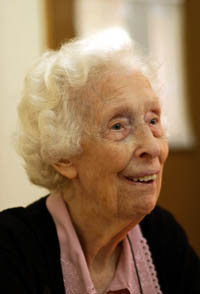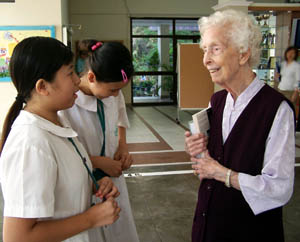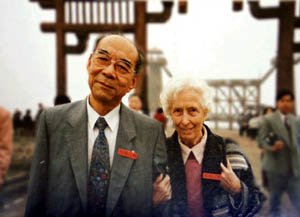People
Other Stories

Photo by Luo Xi
Elsie Tu: Fights on
When elections of the Hong Kong Urban Council, now defunct, took place in the 1970s, most of the people had no voting rights. All they could do was to campaign for the one they supported. Many citizens, including the poor and the old, were seen putting banners on their clothes and shouting: “Vote for Elsie” in Cantonese.
Elsie Tu, a British, was well known for protesting against the British government for the Chinese in the colonial period. People, especially the poor, came to her, knowing for sure that she would at least try to help.
Being passionate, righteous and fearless, Mrs Tu has never stopped fighting for her beliefs.
“I'm 92 years old but I'm not retired yet. I still want to work and help people as much as I can,” said Mrs Tu, a former legislator and veteran social activist.
Prominent for her battle against corruption and social injustice in the 1960s and 1970s, Mrs Tu was known as the “conscience of Hong Kong ” back then.
She served as an urban councillor for more than 20 years since 1963 and became a legislator in 1988, but was defeated by democrat Szeto Wah in the 1995 election.
She made a brief comeback to the political scene immediately after Hong Kong 's return to China in 1997, serving the Beijing-appointed provisional legislature.
She did not stand for the territory's first legislative poll under Chinese rule in 1998.
“But I still try to do as much as I can,” Mrs Tu said. “For example, just like in the old days, I often write letters to the government, politicians and some organisations to make suggestions. I still consider it part of my job now.”
She recently wrote a letter to radical democrat Leung Kwok-hung, who is known as “Long Hair” and for his Che Guevara T-shirts, to give him advice. “I said that I agreed with many of his ideas but not his methods. He's only advertising himself.”
To be a true democrat, she argued, Mr Leung should try to do more for the people and dress properly. This way he can win more respect and therefore more votes.
After leaving the Legislative Council, Mrs Tu continued to work as the superintendent of Mu Kuang English School, which she founded with her husband, Andrew Tu Hok-fui, in 1954.
“I check the finances of the school, sign the papers, make teaching materials for the students and also teach oral English sometimes.”
Despite all the work for her, Mrs Tu remains energetic. “I usually sleep for about seven hours a day. Most of the time I simply work and read.”
Back to her school days in Britain , Mrs Tu was a keen athlete. She was the captain of both the lacrosse and rounders teams. As a fast runner, she was nicknamed “spitfire”, one of the fastest fighter planes back then.
Her talent in sports and strong will may explain where her energies come from.
“Of course, I still have to adjust my work according to my health situations. Like now, I really want to teach more, but I'm losing my voice. So I can only teach two or three students at one time.
“But I really want to work and help others as long as I live,” she said.
A persistent mind
Mrs Tu has had a conviction to help people since she was young. She grew up in a working class family in northeast England , where she became a Christian and made her life-changing decision.
“To become a missionary in China , I decided,” she said. At that time, Mrs Tu considered it was the best way to commit herself in a total service for others.
However, she doubted her call as a missionary after years of experience in Nanchang in mainland China and later in Hong Kong . She found her church was more interested in observance of petty regulations than in helping the needy.
“I wanted to teach more than the Bible, I wanted to do more for others, but they always told me what I should not do,” she said. “I like the feeling that I'm free, that I can make my voice heard.”
Sticking to her belief, she left her missionary job in 1955 and started fighting against social injustice and helping the poor in Hong Kong .
At the age of 89, Mrs Tu published Colonial Hong Kong in the Eyes of Elsie Tu in 2003. “I wrote it because I want people to know what it was like in those days,” she said. “Young people today can hardly imagine.”
The book brings people back to the “dark days” of Hong Kong in the colonial period. At that time, behind the economic miracle, there were sufferings and injustice inflicted by the greedy and corrupted government.
“When I came to Hong Kong , I was really upset by how the Chinese were being treated unfairly in the British colony. It was awful.
“It was not supposed to be the way British people do things. I was ashamed of the colonial leaders in Hong Kong ,” she said.
The fact that the Chinese were the second class citizens made Mrs Tu very angry. To help them protect their rights, she often argued with the government.
Those days she dealt with 400 to 500 cases a month, which were mainly problems concerning housing, education, welfare, working conditions and public transport.
She was dissatisfied that the government would pour millions to build facilities serving the elite but not the majority of Hong Kong residents.
Mrs Tu also fought hard against corruption. She made enemies and had to face the consequences in the early 1970s.
“For example, I received many malicious calls. Once someone told me if I were a Chinese or a man, I would certainly be dead.
“And sometimes I was framed for things I never did, then I had to go to court.
“Once when I went to the police station for help, the policeman simply told me ‘Madame, I think you need to see a psychiatrist',” Mrs Tu said, shaking her head a little.
Difficult her battles were, Mrs Tu had never been intimidated. “I wanted to do something to solve the corruption. Being scared wouldn't help.”
A lonely heart
Strong and fearless as Mrs Tu appears, she feels lonely deep inside, especially since her husband died four years ago.
“I have plenty of friends in my school and some English friends though.” After pausing for a moment, she said: “After all, it's not like if your husband were still here.”
She met Mr Tu in 1951, her first year in Hong Kong . “He lived next door to our church. He loved music and he heard the church choir sing. So he came and sang with us.”
But at the time, she was married to William Elliot, a British Christian. In 1955, when she left the church to protest for the poor, Mr Elliot was against her decision, and their marriage fell apart.
Her friendship with Mr Tu then turned into a lifelong commitment.
“We supported each other in fighting against the injustice. He was very patriotic and enjoyed helping people. That's why I gave him the English name ‘Andrew'.
“We promised to be with each other forever,” she said. “When I die, I will be buried with him here, in Hong Kong .”
The only thing Mrs Tu regrets about this marriage is that she could not have children with Mr Tu.
“But if I have had any children, I wouldn't have been able to spend so much time on society,” she said. “So even though I regret sometimes, at the end it would all work out for something better.”
Political stands unchanged
Mrs Tu's devotion to the public won her the Grand Bauhinia Medal in 1997, the highest award in the Hong Kong honours system created by the government after the handover. She was the first woman winner.
“I was happy to receive the award,” she said, “it's such an encouragement for me to do more for others.”
However, respected and recognised by the post-handover government, Mrs Tu has been accused by some critics of changing her attitude towards democracy.
“People say I support the Chinese Communist Party rather than democracy. I do not agree,” she said.
“I haven't changed my beliefs at all. I want social justice and I hope the poor will have a say and be treated fairly. That's my view of democracy.”
Supportive to democracy, Mrs Tu approves of the efforts made by the Chinese central government.
“I believe China 's stepping into democracy gradually with its own characteristics. Slow the progress might seem, at least the government's trying to help the poor and they are doing a much better job than before.”
Still, Mrs Tu is critical of the corruption in mainland China and some unsatisfactory policies made, especially those concerning Hong Kong . Like what she often does to the Hong Kong government, she has also written many letters to Beijing .
As for Hong Kong , Mrs Tu is puzzled by the upsurge of local democracy promotion after the colonial rule.
“I doubt the sudden change will bring true democracy,” she said.
“The western way of democracy is very corrupted, Hong Kong should not ‘copy and paste' the system and call it democracy.”
Mrs Tu pointed out that during the colonial period, democracy was not considered a major political issue in the territory even though she was fighting for it.
“Now suddenly there emerged so many democracy promoters. I doubt their motives.”
Mrs Tu took lawmaker Martin Lee Chu-ming, a former chairman of the Democratic Party, as an example.
“He said he was busy making money when he was young, and now he had enough money, he became interested in democracy, and that's why he founded the Democratic Party.
“But I think if you are a real democrat, you think about democracy all your life. You
cannot suddenly become ‘interested' in it.”
Reacting to Mrs Tu's words, Mr Lee argued that he was afraid that there would be no democracy in Hong Kong after its return to China , and that was why he co-founded the Democratic Party.
“Besides, you can't ask a three-year-old boy to know what democracy is,” he said. “People have to learn about it before they become democrats.”
Mrs Tu is also concerned about the attitude of many other Hong Kong democrats.
“They tend to go extreme and argue against everything, which disturbs social order,” she said. “And some of them are too theoretical. They should get down on the ground and do real things.”
Still, Mrs Tu has faith in Hong Kong .
“Despite the economic woes, Hong Kong 's already a much better city than before. It surely will be even better in future.”

